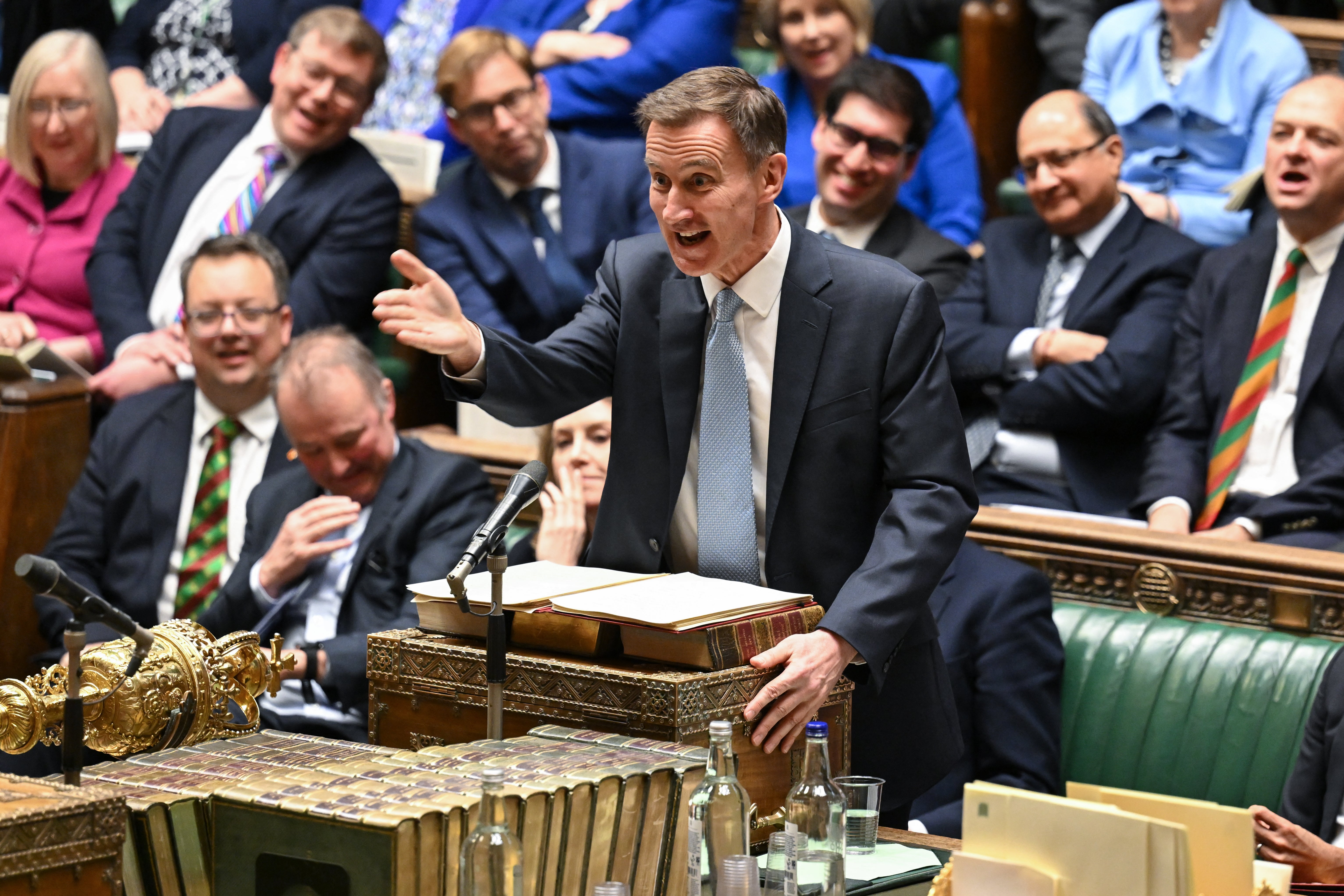This was a nakedly political Budget – and it won’t save the Tory party
People view the government as taking with one hand and giving back a little bit of it with another – Andrew Grice warns that the Conservatives have run out of time to change the course of public opinion


Jeremy Hunt’s Budget won’t save the Conservatives from election defeat. We don’t need a crystal ball to tell us that because we can read the book: the first two percentage point cut in national insurance, in the autumn statement last November, didn’t dent Labour’s commanding lead in the opinion polls. Nor will today’s repeat.
Why? People know the overall tax burden is rising to its highest level for 70 years. This is not an abstract, academic point: voters feel it. Hunt’s two national insurance reductions, giving back £18bn, will nowhere near compensate for the six-year freeze in income tax thresholds and allowances, which will eventually bring in more than £50bn a year.
The polls and focus groups tell us that many people will view the government as taking with one hand and giving back a little bit of it with another. “They take £10 and give back £2,” was a common response to the autumn statement. The verdict on the Budget will be the same. And the public know that more tax increases are coming: the five per cent rise in council tax bills in April will be bitterly resented, especially as many local authorities will charge more for less as they cut services – largely as a result of the squeeze imposed by central government.
A 2p in the pound reduction in income tax, which Rishi Sunak would have preferred, would have been a bigger bazooka and might have grabbed the public’s attention more than national insurance could ever do. But that would have cost £14bn and Hunt did not have the money. Certainly, many Tory MPs, still in love with Margaret Thatcher and her tax-cutting chancellor Nigel Lawson, were hungry for an income tax cut.
So the Tories are stuck with national insurance and are literally doubling down on it; Hunt hinted at further cuts rather than a reduction on income tax. The Tory manifesto might promise the eventual abolition of national insurance rather than Sunak’s pledge, made during his 2022 Tory leadership contest against Liz Truss, to reduce the basic income tax rate from 20p to 16p in the pound. A broken promise, it seems.
There’s another reason why the Budget won’t turn the political tide. Sunak and Hunt, two technocrats and honourable men, brought stability after chaos, but it was always going to be difficult to regain the public’s confidence in their party’s tarnished brand after Boris Johnson’s lies and Liz Truss’s incompetence. They are shuffling the deckchairs on the ToryTitanic. The mood of the country is settled, and for change. That won’t be altered by Hunt’s last-minute tax bribe, any more than Kenneth Clarke, a more substantial chancellor, saved the Tories by cutting taxes before Labour’s 1997 landslide.
Hunt avoided headlines about a further round of austerity by not imposing even more cuts in public spending. There had been Treasury hints he might reduce the 1 per cent annual rise in spending to 0.75 per cent to save about £5bn, but he shied away from it. However, his remarkably vague budgets for day-to-day spending in future years are based on £20bn of unspecified budget cuts in areas such as the Home Office (including the police); the courts, prisons and our already overstretched local authorities.
Some senior Tories admit privately they would struggle to implement such cuts but, like much in this Budget, they are designed to wrongfoot Labour – such as the shameless hijacking of Labour’s crackdown on non-doms.
Hunt’s push for productivity improvements in the public sector is welcome and investment in them is overdue. But efficiency savings are the oldest trick in the Whitehall book and they will not change anytime soon the experience of people wanting a GP appointment or hospital operation, or erase the impression of a “broken Britain” in which nothing works.
There has been a new flurry of speculation at Westminster in recent days that Sunak might opt for a 2 May general election. I doubt it and my view hasn’t been changed by the Budget.
The prime minister would have to call such a contest later this month but the UK is still in recession, inflation has not yet fallen to the Bank of England’s 2 per cent target and interest rates are not yet being cut. So this month still feels too soon to change Sunak’s “working assumption” the contest will be in the second half of the year.
Although the bill declaring Rwanda a safe country will probably clear parliament by the end of this month, the first flight to Kigali could still be delayed by another legal challenge. And then there’s Labour’s 20-point poll lead. The temptation for the PM will be to hope that something turns up by October, and the economy looks more like it has “turned the corner” than it does now.
Despite the fall in inflation, the cost of living crisis remains the number one issue for the public. Although the two cuts in national insurance will mean lower personal taxes for those in the £25,000 to £50,000 income range since the 2019 election, the majority of people will accurately answer “no” when Labour asks them whether they are better off than they were then. That remains Labour’s trump card after this Budget, and Sunak has now run out of time to change it.






Join our commenting forum
Join thought-provoking conversations, follow other Independent readers and see their replies
Comments